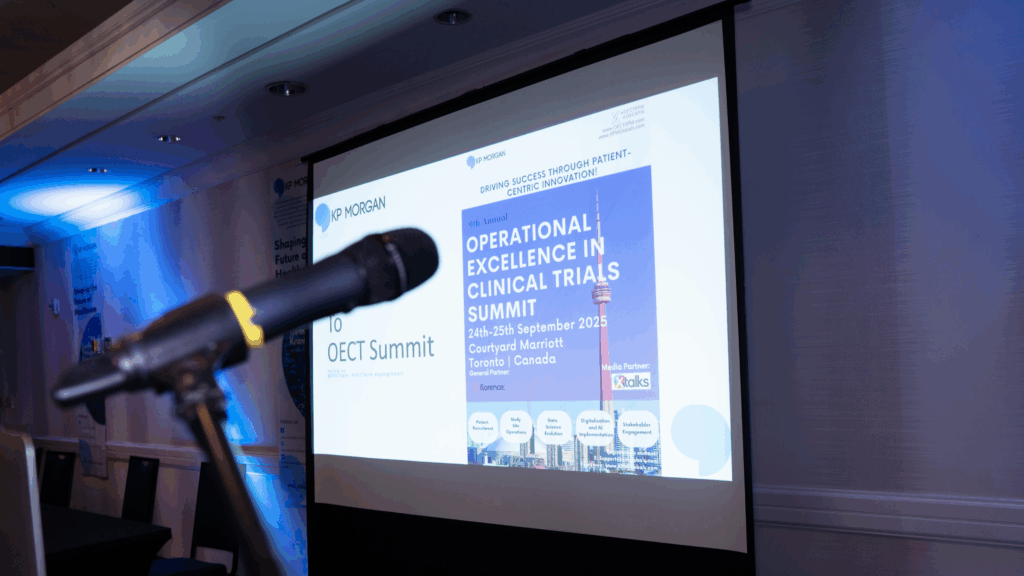KP Morgan’s 9th Annual Operational Excellence in Clinical Trials (OECT) Summit, held in Toronto on September 24-25, 2025, brought together expert voices in clinical research. Over two days, professionals from pharma, biotech, CROs, technology providers and research institutions exchanged ideas, shared lessons and explored the innovations that are influencing clinical development.
As the official Media Partner for the Summit, Xtalks spoke with attendees to capture insights on the challenges and opportunities shaping the industry today.
Their perspectives underscored a common theme: operational excellence is about far more than efficiency; it’s about collaboration, adaptability and keeping patients at the center of clinical trials.
Collaboration and Communication Across Stakeholders
Regulatory complexity was one of the first topics that surfaced. Many leaders emphasized that the pace of change in compliance frameworks requires constant vigilance. For those involved in late-phase operations, the ability to interpret shifting requirements and make decisions quickly is essential.
“I would say day-to-day is just trying to navigate the complex regulatory landscape, understanding what the requirements of early access programs are and just problem-solving,” said Tania Azad, Global Program Director – Late Phase Clinical Operations, Alexion Pharmaceuticals.
Beyond regulations, site collaboration emerged as another priority. Clinical trials succeed when all stakeholders, from sponsors and CROs to investigators and site staff, work in alignment.
“I do a lot of work with sites and with folks in the industry, hearing about their problems, sort of in a thought leadership capacity, trying to work to bring sponsors, CROs and sites together to discuss the challenges that we’re facing and come up with solutions,” explained Andrea Bastek, PhD, VP Market Strategy, Florence Healthcare.
This spirit of collaboration often depends on proactive communication. Sites are not only tasked with running studies but also with ensuring alignment across multiple partners. As Stella Rho, MHSc, Clinical Research Associate 2, Toronto Immune and Digestive Health Institute, described, “Sometimes I have to initiate that communication with the sponsors and CROs, saying, ‘What are the action items? What’s the progress?’”
Patient Recruitment and Retention
The conversation then turned to patient recruitment and retention. Educating patients and building trust were identified as critical factors in ensuring participation.
“I think one of the challenges we’re seeing is about patient education. We like to make sure patients are aware of the study. We’re also wanting to make sure patients have the right information about the study,” said Kevin Lin, MBA, MSc, Director, Innovative Patient Recruitment, Evinova.
For others, the focus was on ensuring that underrepresented voices are not left out of the research process.
“Our mission is to be the voice of the patient, advocacy for the patient, to bring clinical trials to patients from all different types of socioeconomic backgrounds,” noted Naty Diaz, CEO, Prestige Clinical Research.
Diversity was also discussed in terms of gender representation, with an emphasis on ensuring clinical trials reflect the populations they serve. Speakers also highlighted the importance of PI gender parity in advancing more inclusive research.
“I’m passionate about gender diversity, making sure that we have more women in clinical trials because it represents our population,” said Mary Tzortzis, Regional Clinical Operations Country Head, Canada, Bristol Myers Squibb.
Representation, speakers argued, is not just about equity; it’s about the science itself. “When it comes to underrepresentation, if they’re not part of that study, if we don’t understand what they’re giving, we’re not going to be able to build the best thing possible for solutions moving forward,” added Jessica Rivera, Marketing Director, Prestige Clinical Research. Her perspective highlighted the link between diversity and the quality of outcomes, making inclusion not just a matter of fairness but of necessity.
Ensuring Data Quality and Global Trust
Alongside the patient perspective, speakers also pointed to the growing demands of data management and risk oversight in modern trials. As protocols become more complex, so too do the systems required to monitor them effectively.
Melissa Thomas, PhD, Central Monitor Consultant, CluePoints, explained, “Trials are getting more complex. We’re collecting more data and finding ways to effectively and efficiently monitor those risks and to ensure that data quality is there throughout the trial.”
The conversation around trust also expanded to institutional processes, where innovation in authorization models could strengthen protections in human research. Alex Karabanow, Senior Manager of Operations, Clinical Research Services, University Health Network, emphasized the importance of national accreditation standards.
“If we have these national standards and accreditation programs in place, this will allow institutions from outside of the country to work with us and trust that we are at the same level as the global standard for accreditation all across the world. And if we do that, then we will be able to attract those trials to Canada,” he said.
While systems and standards are critical, financial pressures cannot be ignored. Funding remains a significant barrier, particularly for smaller organizations looking to scale. Tina Karunaratne, MS, LPD, Founder and CEO, Karuna Integrated Clinical Services, spoke about this hurdle: “So the challenge is, I think, the budgets and the costing. I think it’s really hard for startups to actually start gaining the trust of the investors, getting the funding.”
Innovation at the Pace of Clinical Research
Many OECT 2025 Summit attendees pointed to the speed and adaptability of today’s clinical research environment as a source of energy and progress.
Marlise Benz, Senior Director Study Management, AstraZeneca, summed this up: “Things move so fast nowadays that we have to be ready to pivot based on competitor data or even our own data coming out. So, I think just keeping that collaboration in close communication, despite the speed at which we want to work, that’s a big challenge, but something I think that myself and my team really enjoy.”
Whether through smarter collaboration, stronger data practices or more inclusive patient engagement, KP Morgan’s 9th OECT Summit demonstrated that clinical research professionals are prepared to meet complexity with innovation and optimism.
As the Media Partner, Xtalks was proud to highlight the perspectives of those driving operational excellence in clinical trials and to share the momentum generated by this event.












Join or login to leave a comment
JOIN LOGIN